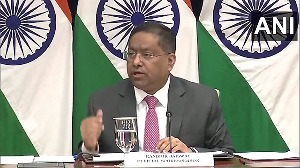Indian infotech firms, which are eyeing the European Union as an alternative destination to the US market to expand their global presence, can breath easy as the upcoming German immigration law will ensure that the interests of their onsite software professionals are protected.
With the current five-year green card permits to non-immigrant Indian techies expiring this July, the German government is framing a new law to address the growing concerns of Indian knowledge workforce, which is facing backlash from locals on job losses in the US, UK, and elsewhere.
"The present visa system is being replaced with a new immigration law that will come into force from 2004 after the draft bill is passed by both the lower and upper houses of German Parliament by this year-end. Though the 5-year green card expires by July-end, there will be no problem for the 3,000-odd Indian professionals currently employed and living in Germany as their status quo will continue till the new law is implemented," Bavaria head of international operations Peter Englert told rediff.com in Bangalore on Thursday.
Besides the visa rules, the German government is also addressing the concerns of the Indian IT firms on the legal, taxation, and intellectual property rights issues so that they can either set up wholly-owned subsidiaries or joint ventures to tap the huge potential for IT services and products in the European Union.
The German assurance comes in the light of the proposed curbs on Indian IT professionals by the US Natural Immigration Service under the annual H1B and L1 visa quotas due to rising unemployment among the natives and increased outsourcing of IT services to the Indian sub-continent.
Englert declared that Indian professionals also need not worry about the fate of their spouses and dependents as the proposed visa rules would enable them to stay along with them and take up jobs one year after staying in the country.
"There will not be restrictions on non-immigrant professionals, especially IT specialists from India, in setting shop or taking up jobs, as Germany is keen to engage them in making our city-states as alternative technology hubs to those in the US," Englert stated.
German Chancellor Gerhard Schroeder assured Prime Minister A B Vajpayee in Berlin on Wednesday that his country would further liberalize its visa regulations under the revised program and remove existing glitches to attract Indian IT firms and their high-tech engineers.
In a related development, ever since the Munich-based gotoBavaria set up its liaison office in Bangalore in October 2001, about 10 Indian IT companies have entered the German state to take up IT projects and services in the EU.
"Apart from the IT bellwethers Infosys, Wipro, and Satyam, medium size IT firms such as Aftek Infosys, NIIT, and Digital GlobalSoft have set up their subsidiaries in Bavaria, while 10 more have shown interest in investing in Germany," Englert declared.
With the US no longer the preferred destination for the Indian software sector due to continued tech meltdown and a weakening dollar, big-ticket investments have started flowing into the EU, including Germany and Bavaria.
"The 49 per cent acquisition of the Munich-based Arexera Information Technologies by the Pune-based Aftek Infosys recently is a precursor to the kind of investments set to flow into Europe for tapping the potential for IT products and services," Englert claimed.
Taking a cue from Schroeder, who beseeched Indian geeks to take jobs in Germany, Bavaria is wooing the Indian ICT sector to make its state a gateway to Europe for capturing a major share of the EU market.
"Even in the face of global downturn, the IT market in the 15-state European Union grew to a whopping euro 650 billion during 2001-02, which includes revenues of Euro 200 billion each from hardware and software sectors, and Euro 250 billion from telecom sector," Englert disclosed. The share of the German IT market is about euro 140 billion.
Being major financial, industrial, and trade center, Munich offers huge potential for Indian IT firms to locate themselves closer to their prospective clients. With global auto majors such as BMW and Audi located in Bavaria, the scope for electronic and IT services is immense.
"In fact, Bavaria will stand to benefit largely from the high-end skills of Indian techies in the field of e-learning as its workforce has been historically trained to meet the demands of the region's growing IT sector, with about euro 30 billion revenues in 2001," Englert affirmed.
Just as Bangalore has been recognised by the United Nations Development Program as the world's fourth largest technology hub, Munich is known as the fourth largest technology center in the world, after the Silicon Valley, Boston, and Tel Aviv.
Though the Bavaria has around 8 million population, it boasts of 7 million non-German or migrant population, demonstrating its track record of being a multi-ethnic region with diverse cultures and traditions brought about by citizens of different nationalities and races.






 © 2025
© 2025